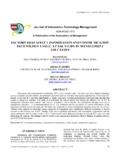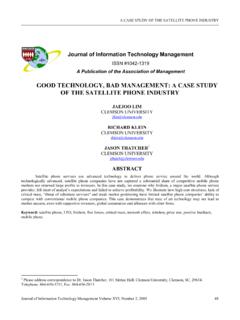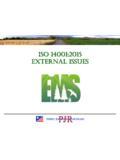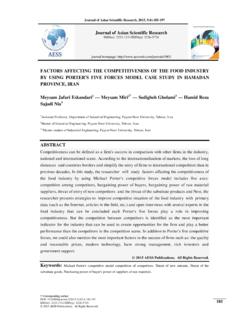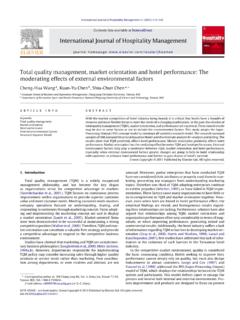Transcription of FACTORS AFFECTING THE OUTCOMES OF PERFORMANCE …
1 FACTORS AFFECTING PERFORMANCE MANAGEMENT SYSTEM OUTCOMES . Journal of Information Technology Management ISSN #1042-1319. A Publication of the Association of Management FACTORS AFFECTING THE OUTCOMES OF PERFORMANCE . MANAGEMENT SYSTEMS. AL BENTO. UNIVERSITY OF BALTIMORE. REGINA BENTO. UNIVERSITY OF BALTIMORE. ABSTRACT. This paper proposes and tests a model to explain three critical OUTCOMES of PERFORMANCE Management Systems: information quality, effectiveness, and usefulness of the PMS to managerial decision-making. Drawing from Organizational Information Processing Theory (OIPT), we examined how those three OUTCOMES may be influenced by FACTORS that affect OIP. requirements (industry, size, and geographic scope of operations) and by organizational and technological FACTORS that affect OIP capabilities.
2 Organizational FACTORS included management's decision-making style and organizational structure. Technological FACTORS included the types of technology used in the PMS (ERP; specialized tools such as EIS and DSS; and generic tools such as Excel, Access and Lotus Notes), and the degree of use of e-commerce and Internet technologies. We used stepwise regression to analyze data from a sample of 1,990 respondents in small, medium and large organizations, operating at regional, national, international and global levels across a broad range of the Dow Jones Global Industry Groups. Keywords: PERFORMANCE Management Systems, Organization Information Processing, Information Quality, Effectiveness, Usefulness. managerial decision-making.
3 Drawing from the literature INTRODUCTION on Information Processing, we propose a model that examines how those three PMS OUTCOMES may be Organizations are investing ever-increasing influenced by a variety of FACTORS that affect, on the one amounts of resources into PERFORMANCE Management hand, an organization's information processing Systems, but it is still not clear what they can expect in requirements and, on the other hand, its information return, or how they might influence the likelihood of processing capabilities. positive system OUTCOMES . This study applies Information The empirical test of the model explored three Processing Theory to develop and test a model of main environmental and organizational FACTORS AFFECTING environmental, organizational and technological FACTORS information requirements: the nature of the industry, the that are hypothesized to contribute to PMS OUTCOMES .
4 The size of the organization, and the geographic scope of its empirical test of the model was conducted using a operations (ranging from regional to global). The database with findings from a survey of 1,990 empirical study also examined two sets of FACTORS , organizations. organizational and technological, that affect the capability The goal of the study is to explain three critical of the firm to process information. The organizational PMS OUTCOMES : information quality, effectiveness, and FACTORS considered in the study were management's usefulness of the PERFORMANCE Management System to decision-making style (command and control vs. Journal of Information Technology Management Volume XVII, Number2, 2006 23.)
5 FACTORS AFFECTING PERFORMANCE MANAGEMENT SYSTEM OUTCOMES . collaborative), as well as organizational structure. RESEARCH QUESTION, MODEL. Technological FACTORS included the types of technology used in the PMS (ERP; specialized tools such as EIS and AND HYPOTHESES. DSS; and generic tools such as Excel, Access and Lotus PERFORMANCE Measurement Systems (PMS). Notes), and the degree of use of e-commerce and Internet enable organizations to plan, measure and control their technologies. PERFORMANCE , so that decisions, resources and activities The study used stepwise regression to analyze can be better aligned with business strategies to achieve data from a sample of 1,990 respondents in accounting, desired results and create shareholder value.
6 Finance, general management, information technology etc. This study addresses the following research The sample included small, medium and large question: "What FACTORS , internal or external to the organizations, operating at regional, national, organization, explain the OUTCOMES of PERFORMANCE international and global levels across a broad range of the Management Systems?". Dow Jones Global Industry Groups. In order to answer this question, we used the The following sections summarize the relevance model shown in Figure 1 to examine the FACTORS of the study, the model that was used to explore the contributing to three types of PMS OUTCOMES : usefulness, FACTORS influencing PMS OUTCOMES , the research question effectiveness and quality of information.
7 And hypotheses inspired by the model, the methodology that was used to empirically test the model, the results obtained and their implications for research and practice. Figure 1. FACTORS contributing to PMS OUTCOMES Usefulness is defined in the literature as the Effectiveness of a PMS is the degree to which degree to which a person believes that using a particular the system delivers its intended results [9], , helping system would enhance PERFORMANCE [11]. Usefulness is organizations to plan, measure and control their related to the concept of voluntary IS "use" [2,3]. The PERFORMANCE , as described above. actual usage of information systems is widely considered Information Quality (IQ) is a multifaceted an important measure of IT success in organizations, and concept, with an entire stream of research just trying to has been found to have a strong correlation with the define what it means.
8 For the purposes of this study, we perceived usefulness of a system by the user [8]. Journal of Information Technology Management Volume XVII, Number2, 2006 24. FACTORS AFFECTING PERFORMANCE MANAGEMENT SYSTEM OUTCOMES . used the widely accepted definition of IQ as "fitness for generate and process information: Enterprise use." [1]. Resource Planning (ERP), specialized tools Various FACTORS may contribute to PMS (EIS - Executive Information Systems, DSS- usefulness effectiveness and information quality. The Decision Support Systems) or generic tools FACTORS identified in the model in Figure 1 were inspired (Excel, Access, Lotus Notes);. by Organizational Information Processing Theory, or OIPT [4,5,6,7,10]. The level of use of e-commerce and Internet According to OIPT, organizations face different technologies to facilitate the flow of levels of uncertainty, , "the difference between the information.
9 Amount of information available and the amount of Based on the OIPT-inspired model in Figure 1, this information required to perform the task at the desired study therefore investigated the following hypotheses: level of PERFORMANCE " [4]. This difference characterizes the information processing requirements of the task. The H1: The higher the level of uncertainty in an rightmost column in Figure 1 shows three FACTORS that, industry, the higher the likelihood that according to OIPT, can be expected to influence the organizations will try to cope with these information processing requirements that a PMS must increased information processing requirements meet: industry, scope of operations, and size of the by improving their information processing organization.
10 Different industries vary in their velocity capabilities through organizational adaptation and predictability of change, and the resulting levels of (structure, management style) and technology uncertainty raise different levels of information (types of PMS technology, Internet, e- requirements. Uncertainty, and therefore information commerce). requirements, can also be expected to increase as H2: The broader their geographical scope of organizations expand in terms of their geographic scope operations, the higher the likelihood that of operations (regional, national, international, or global) organizations will try to cope with these and size (small, medium, large organizations). increased information processing requirements OIPT proposes that organizations deal with these by improving their information processing increased information processing requirements by trying capabilities through organizational adaptation to reduce the effects of uncertainty through buffering (structure, management style) and technology ( , extra inventory) or by increasing their information (types of PMS technology, Internet, e- processing capabilities through structural mechanisms commerce).
